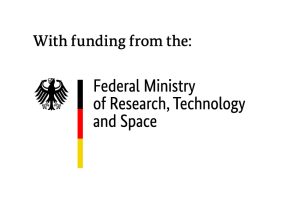The Research Institute Social Cohesion (RISC) has been researching issues of social cohesion from different perspectives and at eleven locations in Germany since 2020. The Hamburg RISC location at the HBI is investigating the role that media and communication play in creating or jeopardising social cohesion.
As of June 2024, the RISC has entered its second funding phase (see also the press release ‘Research Institute Social Cohesion Enters Second Funding Phase’).
The RISC was established in 2020 by the Federal Ministry of Education and Research (BMBF) as an interdisciplinary and decentralised institute to advance basic research on issues of social cohesion. Provided that it passes an interim evaluation in autumn 2024, the institute will be funded by the Federal Ministry of Education and Research (BMBF) until 2029.
In the second phase, the RISC will focus its research and knowledge transfer on the current interrelationships between social cohesion and the processes of social transformation taking place today, including the climate crisis, transnational processes of entanglement and disentanglement, war and migration, and the contested future of democratic cohesion.
At eleven locations in Germany, the RISC combines the expertise of around 200 researchers with the aim of linking applied research on issues of social cohesion with current social challenges and providing impetus for public discourse through innovative knowledge transfer.
In addition to the HBI in Hamburg, the members of the network include the Technical University of Berlin, the Universities of Bielefeld, Bremen, Frankfurt, Halle-Wittenberg, Hanover, Constance and Leipzig as well as the Sociological Research Institute Göttingen and the Institute for Democracy and Civil Society Jena.
Further information about the institute as a whole can be found on the RISC website.
Working at the RISC Hamburg
In the new funding phase, the RISC Hamburg is continuing the work of the first funding phase by focusing on several key areas with the transformative power of interlocking media and social change.
From this perspective, social cohesion is understood as a process in which people relate to each other through communication. This occurs not only in exchanges between individuals or in small groups, but also, and in particular, through public communication. It enables people to recognise the issues that are relevant to society and imparts knowledge about upcoming issues, decisions and events. At the same time, public communication in a democracy should also reflect the diversity of life situations, interests and cultural ideas.
Transformation of the Social Communication Order
The RISC in Hamburg deals with the changing communication, information and participation practices of our contemporary society, which are particularly permeated by digital and increasingly automated media. These changes facilitate opinion-forming and participation in socially relevant decisions. At the same time, disinformation, hate speech and populist exaggeration are flourishing. New platforms and pioneering communities are emerging alongside established journalistic organisations and experimenting with formats that organise social dialogue differently.
In order to research the changes and their consequences for social cohesion, the RISC Hamburg combines empirical analyses and theoretical-conceptual work. This is done both by drawing on empirical data from the Qualitative Panel and the Social Media Observatory (SMO) and by means of theoretical-conceptual syntheses. The aim is to capture the developments in a concept for the transformation of the social order of understanding.
Social Media Observatory
The monitoring infrastructure of the Social Media Observatory (SMO) established in the first funding phase of the RISC (2020-2024) will be consolidated and expanded. The SMO is a central organisational unit of the RISC and enables the systematic and continuous observation of the public sphere in journalistic and social media. This allows debates in social media to be recorded, analysed and visualised.
In addition, the SMO will work in cooperation with other institutes within RISC on questions of polarisation dynamics in digital public spheres and on gender discourses in social media.
To a detailed description of the Social Media Observatory
Transfer
Through its transfer activities, the RISC Hamburg builds bridges between scientific research and interested non-academic target groups. It relies on various formats of science communication, including the ‘Leibniz Media Lectures’ and ‘Leibniz Media Lunch Talks’, the salon series ‘Context Collapse’, the BredowCast and the Media Research Blog.
The researchers regularly make their knowledge available to society, for example through background discussions with media professionals and interviews or through transfer-oriented presentations for social groups, educational institutions and media organisations. They also participate in consultations and hearings in order to incorporate scientific knowledge into political debates and decisions. In workshops and conferences, researchers from the RISC come together with multipliers from science communication and media practice.
Information on the First Funding Phase
In the first funding phase from 2020 to 2024, researchers from various disciplines with empirical studies and large-scale comparisons developed practice-relevant proposals that help to address current social challenges. They cover aspects such as identities and regional experiences, inequalities and solidarity, media and conflict culture, polarisation and populism, but also antisemitism and hate crime, analysing them in a European comparison and beyond.
The Federal Ministry of Education and Research (BMBF) selected eleven institutions from ten federal states in a science-driven competition, which also allows the regional diversity of social cohesion in Germany to be examined.
The Leibniz Institute for Media Research | Hans-Bredow-Institut was involved in the first funding phase at the RISC section in Hamburg with the following five projects:
-
- Media Use and Social Cohesion
- What Journalists Want and What They Ought to Do – The Transformation of the Journalism/Audience Relationship and Its Significance for Social Cohesion
- Integration-Related Remit and Functions of Public Service Media
- Social Media Observatory
- Transfer Office “Media and Social Cohesion”














